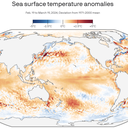Climate scientist warns of implications of 2023's unexplained extreme heat

The head of NASA's Goddard Institute for Space Studies is sounding an alarm in the scientific community — albeit a nuanced one — over how unexpectedly significant 2023's warming was.
Why it matters: Scientists don't yet know why the world warmed by about 0.2°C (0.36°F) more than would have been expected during 2023, lasting into this year, climate scientist Gavin Schmidt wrote in the journal Nature on Tuesday.
Zoom in: Schmidt outlines all the known players on the climate stage during 2023, from El Niño to changes in marine shipping emissions, along with increasing greenhouse gases.
- None of them can explain the enduring spike in global air and ocean temperatures that began last year.
- He calls it "an unprecedented knowledge gap," noting that if the anomaly does not diminish by August, as suggested by past El Niño events, "the world will be in uncharted territory."
- Notably, his predecessor at GISS, James Hansen, published a paper last year arguing we are already in just such a situation.
Threat level: The most worrying possibility, and it is just a hypothesis, is that climate change has "fundamentally alter[ed] how the climate system operates," without warning, Schmidt wrote.
- This could threaten to push the world past known tipping points in the climate, such as a faster slowdown of a key Atlantic Ocean circulation and dramatically sped up melting of the Greenland and Antarctic Ice Sheets.
Between the lines: In an email to Axios, Schmidt said qualitative answers should start streaming in within a few months. New data from research on marine shipping emissions, wildfires, Sahara dust, and other influences, should help shed light on what's happening.
- In addition, scientists hope to glean information from a recently launched NASA mission to provide data on global composition of tiny particles called aerosols.
- How significantly these particles influence the climate is a major uncertainty in climate science.
What they're saying: Schmidt said if the data points to a systemic change, that would have implications going forward, compared to if the 2023-2024 heat were "A 1-in-500-yrs blip."
- He also noted that global warming is proceeding as climate models projected, even with the 2023-2024 aberration.
- "Some people seem to be confused with the general statement that global warming is proceeding as models expect, and the specific uncertainties about exactly why 2023 was anomalous," he said.
- "I don't think there is a contradiction there. They are different questions."
Go deeper: "Red Alert to the world": Record warmth in global oceans hits one-year mark